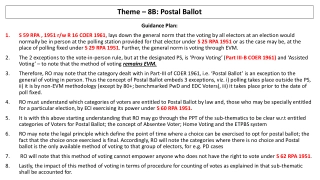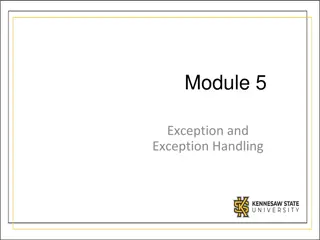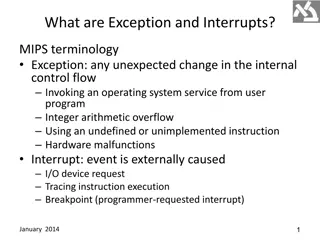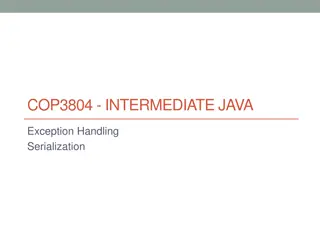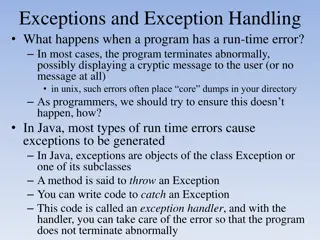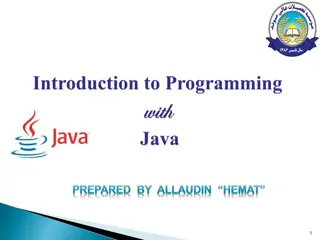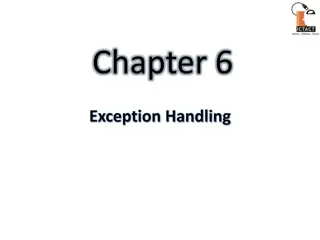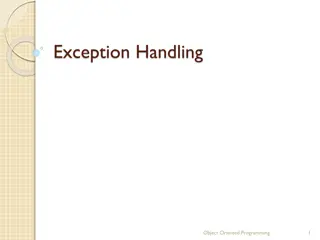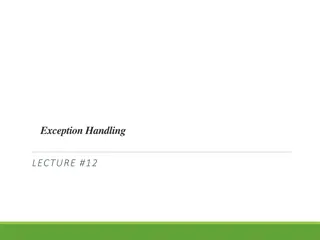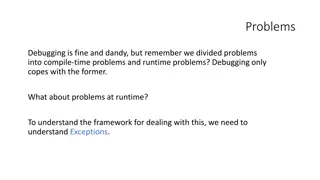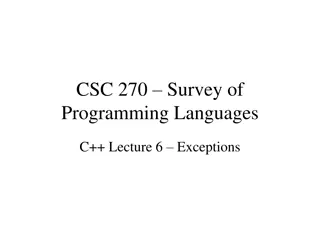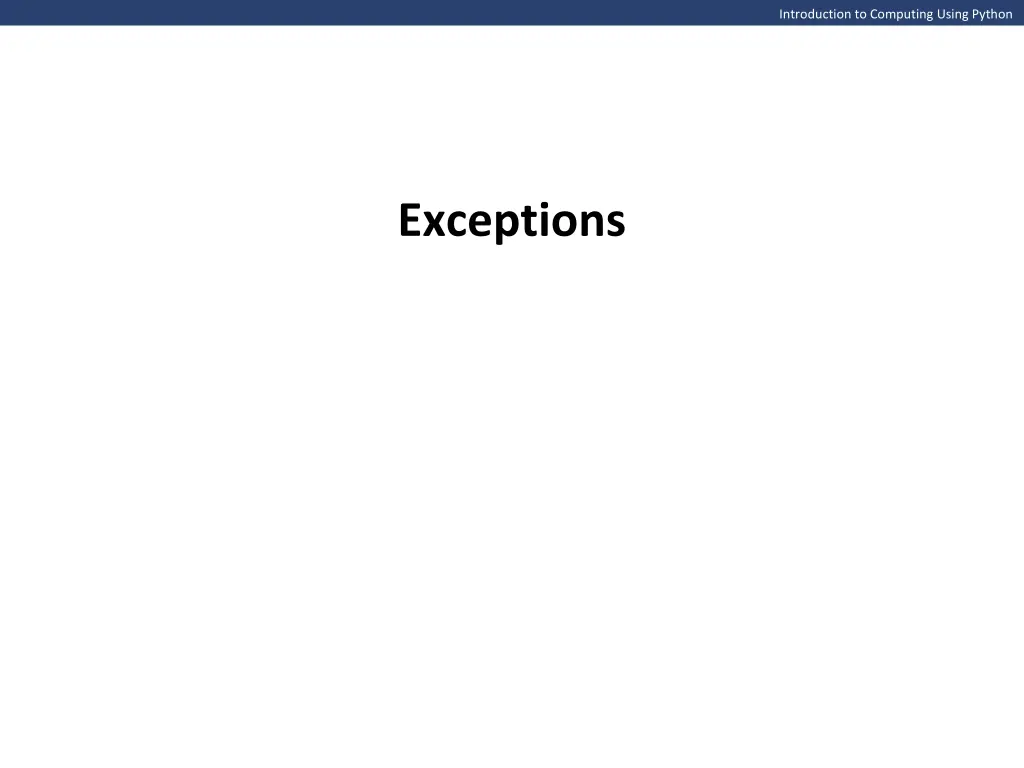
Understanding Python Exceptions and Errors
Learn about different types of errors in Python such as syntax errors, erroneous state errors, and exceptions. Discover how errors occur, how they are handled, and their impact on program execution.
Download Presentation

Please find below an Image/Link to download the presentation.
The content on the website is provided AS IS for your information and personal use only. It may not be sold, licensed, or shared on other websites without obtaining consent from the author. If you encounter any issues during the download, it is possible that the publisher has removed the file from their server.
You are allowed to download the files provided on this website for personal or commercial use, subject to the condition that they are used lawfully. All files are the property of their respective owners.
The content on the website is provided AS IS for your information and personal use only. It may not be sold, licensed, or shared on other websites without obtaining consent from the author.
E N D
Presentation Transcript
Introduction to Computing Using Python Exceptions
Introduction to Computing Using Python Types of errors We saw different types of errors in this chapter There are basically two types of errors: syntax errors erroneous state errors >>> excuse = 'I'm sick' SyntaxError: invalid syntax >>> print(hour+':'+minute+':'+second) Traceback (most recent call last): File "<pyshell#113>", line 1, in <module> print(hour+':'+minute+':'+second) TypeError: unsupported operand type(s) for +: 'int' and 'str >>> infile = open('sample.txt') Traceback (most recent call last): File "<pyshell#50>", line 1, in <module> infile = open('sample.txt') IOError: [Errno 2] No such file or directory: 'sample.txt
Introduction to Computing Using Python Syntax errors Syntax errors are errors that are due to the incorrect format of a Python statement They occur while the statement is being translated to machine language and before it is being executed. >>> (3+4] SyntaxError: invalid syntax >>> if x == 5 SyntaxError: invalid syntax >>> print 'hello' SyntaxError: invalid syntax >>> lst = [4;5;6] SyntaxError: invalid syntax >>> for i in range(10): print(i) SyntaxError: expected an indented block
Introduction to Computing Using Python Erroneous state errors The program execution gets into an erroneous state When an error occurs, an error object is created When an error occurs, an error object is created >>> 3/0 Traceback (most recent call last): File "<pyshell#56>", line 1, in <module> 3/0 ZeroDivisionError: division by zero Traceback (most recent call last): File "<pyshell#57>", line 1, in <module> lst NameError: name 'lst' is not defined >>> lst[3] Traceback (most recent call last): File "<pyshell#59>", line 1, in <module> lst[3] IndexError: list index out of range File "<pyshell#60>", line 1, in <module> lst * lst TypeError: can't multiply sequence by non-int of type 'list int('4.5') ValueError: invalid literal for int() with base 10: '4.5' base 10: '4.5' This object has a type that is related to the type of error The object contains information about the error The object contains information about the error The default behavior is to print this information and interrupt the execution of the statement. This object has a type that is related to the type of error >>> lst >>> lst = [12, 13, 14] The error object is called an exception; the creation of an exception due to an error is called the raising of an exception >>> lst * lst Traceback (most recent call last): >>> int('4.5') Traceback (most recent call last): File "<pyshell#61>", line 1, in <module> File "<pyshell#61>", line 1, in <module> int('4.5') ValueError: invalid literal for int() with >>> int('4.5') Traceback (most recent call last):
Introduction to Computing Using Python Exception types Some of the built-in exception classes: Exception Explanation KeyboardInterrupt Raised when user hits Ctrl-C, the interrupt key OverflowError Raised when a floating-point expression evaluates to a value that is too large ZeroDivisionError Raised when attempting to divide by 0 IOError Raised when an I/O operation fails for an I/O-related reason IndexError Raised when a sequence index is outside the range of valid indexes NameError Raised when attempting to evaluate an unassigned identifier (name) TypeError Raised when an operation of function is applied to an object of the wrong type ValueError Raised when operation/function has an argument of the right type but incorrect value
Introduction to Computing Using Python Exceptions: Exceptional control flow Recall that when the program execution gets into an erroneous state, an exception object is created This object has a type that is related to the type of error The object contains information about the error The default behavior is to print this information and interrupt the execution of the statement that caused the error The reason behind the term exception is that when an error occurs and an exception object is created, the normal execution flow of the program is interrupted and execution switches to the exceptional control flow
Introduction to Computing Using Python Exceptional control flow Normal control flow Exceptional control flow 1. def h(n): 2. 3. 4. 5. 6. def g(n): 7. 8. 9. 10. 11. def f(n): 12. 13. 14. print('Start h') print(1/n) print(n) The default behavior is to interrupt the execution of each active statement and print the error information contained in the exception object. print('Start g') h(n-1) print(n) >>> f(2) >>> f(2) Start f Start f Start g Start g Start h Start h Traceback (most recent call last): File "<pyshell#79>", line 1, in <module> f(2) File "/Users/me/ch7/stack.py", line 13, in f g(n-1) File "/Users/me/ch7/stack.py", line 8, in g h(n-1) File "/Users/me/ch7/stack.py", line 3, in h print(1/n) ZeroDivisionError: division by zero >>> >>> f(2) >>> f(2) Start f Start f Start g >>> f(2) n = 2 n = 2 print('Start f') n = 2 n = 2 print('Start f') print('Start f') g(n-1) g(n-1) print('Start f') g(n-1) print(n) n = 1 n = 1 print('Start g') h(n-1) n = 1 n = 1 print('Start g') print('Start g') h(n-1) n = 0 print('Start h') print('Start h') n = 0 n = 0 n = 0 print('Start h') print(1/n) print(1/n) print(n) print(n) print(n) h(0) h(0) h(0) h(0) g(1) g(1) g(1) g(1) f(2) f(2) f(2) f(2)
Introduction to Computing Using Python Catching and handling exceptions It is possible to override the default behavior (print error information and crash ) when an exception is raised, using try/except statements try: strAge = input('Enter your age: ') intAge = int(strAge) If an exception is raised while executing the try block, then the block of the associated except statement is executed strAge = input('Enter your age: ') intAge = int(strAge) print('You are {} years old.'.format(intAge)) print('You are {} years old.'.format(intAge)) except: print('Enter your age using digits 0-9!') The exceptcode block is the exception handler Default behavior: Custom behavior: >>> ========== RESTART ========== >>> Enter your age: fifteen Enter your age using digits 0-9! >>> >>> ======================== RESTART ======================== >>> Enter your age: fifteen Traceback (most recent call last): File "/Users/me/age1.py", line 2, in <module> intAge = int(strAge) ValueError: invalid literal for int() with base 10: 'fifteen' >>>
Introduction to Computing Using Python Format of a try/except statement pair The format of a try/exceptpair of statements is: The exception handler handles any exception raised in the tryblock try: <indented code block> except: <exception handler block> <non-indented statement> The exceptstatement is said to catch the (raised) exception It is possible to restrict the except statement to catch exceptions of a specific type only try: <indented code block> except <ExceptionType>: <exception handler block> <non-indented statement>
Introduction to Computing Using Python Format of a try/except statement pair def readAge(filename): 'converts first line of file filename to an integer and prints it' try: infile = open(filename) strAge = infile.readline() age = int(strAge) print('age is', age) except ValueError: print('Value cannot be converted to integer.') It is possible to restrict the except statement to catch exceptions of a specific type only >>> readAge('age.txt') Value cannot be converted to integer. >>> readAge('age.txt') Value cannot be converted to integer. >>> >>> readAge('age.text') Traceback (most recent call last): File "<pyshell#11>", line 1, in <module> readAge('age.text') File "/Users/me/ch7.py", line 12, in readAge infile = open(filename) IOError: [Errno 2] No such file or directory: 'age.text' >>> 1 fifteen age.txt default exception handler prints this
Introduction to Computing Using Python Multiple exception handlers def readAge(filename): 'converts first line of file filename to an integer and prints it' try: infile = open(filename) strAge = infile.readline() age = int(strAge) print('age is',age) except IOError: # executed only if an IOError exception is raised print('Input/Output error.') It is possible to restrict the except statement to catch exceptions of a specific type only except ValueError: # executed only if a ValueError exception is raised print('Value cannot be converted to integer.') except: # executed if an exception other than IOError or ValueError is raised print('Other error.')
Introduction to Computing Using Python Controlling the exceptional control flow 1. def h(n): 2. 3. 4. 5. 6. def g(n): 7. 8. 9. 10. 11. def f(n): 12. 13. 14. print('Start h') print(1/n) print(n) >>> try: f(2) except: print('!!') print('!!') print('!!') print('!!') print('!!') >>> try: f(2) except: except: except: except: >>> try: f(2) f(2) f(2) >>> try: >>> try: print('Start g') h(n-1) print(n) n = 2 n = 2 print('Start f') print('Start f') g(n-1) g(n-1) n = 2 n = 2 print('Start f') Start f Start f Start g Start f Start f Start g Start g Start h Start h !! print('Start f') g(n-1) print(n) n = 1 n = 1 print('Start g') print('Start g') h(n-1) n = 1 n = 1 print('Start g') h(n-1) n = 0 n = 0 print('Start h') print(1/n) print(1/n) print(n) n = 0 print('Start h') print('Start h') n = 0 print(n) print(n) h(0) h(0) h(0) h(0) g(1) g(1) g(1) g(1) f(2) f(2) f(2) f(2)
Introduction to Computing Using Python Raising an exception >>> while True: >>> while True: >>> while True: >>> while True: >>> while True: By typing Ctrl-C, a user can force a KeyboardInterrupt exception to be raised pass pass pass pass pass Traceback (most recent call last): File "<pyshell#53>", line 2, in <module> pass KeyboardInterrupt >>> >>> raise ValueError() Traceback (most recent call last): File "<pyshell#54>", line 1, in <module> raise ValueError() ValueError >>> >>> raise ValueError('Just joking...') Traceback (most recent call last): File "<pyshell#55>", line 1, in <module> raise ValueError('Just joking...') ValueError: Just joking... >>> >>> try: raise ValueError() except: print('Caught exception.') Traceback (most recent call last): File "<pyshell#53>", line 2, in <module> pass KeyboardInterrupt KeyboardInterrupt >>> raise ValueError() Traceback (most recent call last): File "<pyshell#54>", line 1, in <module> raise ValueError() ValueError ValueError >>> raise ValueError('Just joking...') Traceback (most recent call last): File "<pyshell#55>", line 1, in <module> raise ValueError('Just joking...') ValueError: Just joking... Traceback (most recent call last): File "<pyshell#53>", line 2, in <module> pass pass KeyboardInterrupt >>> raise ValueError() Traceback (most recent call last): File "<pyshell#54>", line 1, in <module> raise ValueError() Traceback (most recent call last): File "<pyshell#53>", line 2, in <module> Any exception can be raised within a program with the raise statement ValueError, like all exception types, is a class ValueError() uses the default constructor to create an exception (object) statement raise switches control flow from normal to exceptional The constructor can take a message argument to be stored in the exception object Caught exception. >>>
Introduction to Computing Using Python User-defined exceptions >>> class MyError(Exception): >>> help(Exception) >>> class MyError(Exception): pass pass Help on class Exception in module builtins: Every built-in exception type is a subclass of class Exception. class Exception(BaseException) | Common base class for all non-exit exceptions. | | Method resolution order: | Exception >>> >>> raise MyError('Message in a bottle') Traceback (most recent call last): File "<pyshell#71>", line 1, in <module> raise MyError('Message in a bottle') MyError: Message in a bottle >>> | BaseException | object . . . A new exception class should be a subclass, either directly or indirectly, of Exception.
Introduction to Computing Using Python Class Queue, revisited class EmptyQueueError(Exception): pass Our goal was to encapsulate class Queue better: class Queue: 'a classic queue class' >>> queue.dequeue() Traceback (most recent call last): File "<pyshell#76>", line 1, in <module> queue.dequeue() File "/Users/me/ch8.py", line 120, in dequeue raise EmptyQueueError('dequeue from empty queue') EmptyQueueError: dequeue from empty queue >>> queue = Queue() def __init__(self): 'instantiates an empty list' self.q = [] def isEmpty(self): 'returns True if queue is empty, False otherwise' return (len(self.q) == 0) To achieve this behavior, we: def enqueue (self, item): 'insert item at rear of queue' return self.q.append(item) 1. Need to create exception class EmptyQueueError def dequeue(self): 'remove and return item at front of queue' if self.isEmpty(): raise EmptyQueueError('dequeue from empty queue') return self.q.pop(0) 2. Modify Queue method dequeue so an EmptyQueueErrorexception is raised if an attempt to dequeue an empty queue is made


